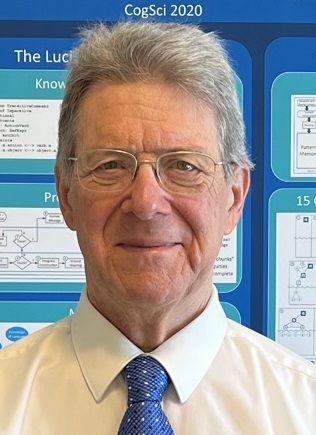Dissertation Defense
Constructing Meaning, Piece by Piece: A Computational Cognitive Model of Human Sentence Comprehension
This event is free and open to the publicAdd to Google Calendar

Meeting ID: 979 6265 1248
ABSTRACT: AI systems with language for robots don’t try to model human processing. Psycholinguistic models of human language processing don’t have operational computational models. This thesis explores two interlocking scientific questions: how does the human mind do sentence comprehension, and how can we enable artificial agents to use natural language with humans. We do this with a system called Lucia, is a computational cognitive model of human sentence comprehension that constructs the meaning of a sentence incrementally, piece by piece.
Lucia draws on research in cognitive linguistics, psycholinguistics, artificial intelligence, and robotics to satisfy qualitative principles of human language comprehension: embodied, end-to-end comprehension; knowledge of the meaning of linguistic forms represented with composable units called constructions; and incremental, immediate interpretation processing using general cognitive mechanisms. The model leads to a theory of language acquisition from experience. Lucia is implemented within a robotic agent called Rosie, using a grammar represented with Embodied Construction Grammar (ECG) and a novel processing algorithm, all built within the Soar cognitive architecture.
Lucia contributes to answering the broader scientific questions by demonstrating grounded comprehension in an embodied agent using ECG, and by providing a novel theory of how memories interact to do incremental processing based on a three-phase construction cycle. It provides a functional model of cognitive sentence comprehension to serve as a basis for further research in modeling human language processing in the brain and in designing larger-scale language systems for artificial agents.
 MENU
MENU 
